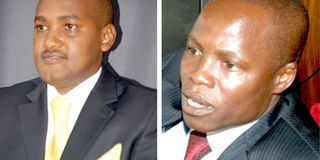Prime
Cabinet must make tough choices to fix economy: Experts

POLICY REVIEW: Tumwebaze. RESTRICT EXPORTS: Oduman
With the health of the country’s economy hanging in the balance and financial markets watching closely, President Museveni convenes a crisis Cabinet meeting today to try to come up with austerity measures that would deliver a blueprint for economic recovery.
Across the nation, the rising public concern caused by double-digit inflation—currently standing at 18.7 per cent, is palpable. Of late, public employees, particularly teachers, medical workers and the business, are increasingly growing impatient as a result of the depreciation of the Shilling and the rising cost of living.
Sick economy
In recent years, Uganda has been credited with strongest growth rates - helped by the implementation of an economic reform programme by President Museveni’s government as well as international aid. But without prudent economic measures, experts and MPs across the political divide are now saying the future will be a test for Uganda.
Ahead of today’s Cabinet meeting, experts, the civil society and the lawmakers on the National Economy, Finance and Budget committees of Parliament have weighed in the crisis—advising Cabinet to undertake a raft of short and long-term measures they think would help salvage the ailing economy.
Comparing the current state of the economy to a sick person on intravenous drip, the Chairperson of the National Economy committee, Mr Stephen Birahwa Mukitale, yesterday warned Cabinet against meeting without experts.
“Our economy is like a patient you cannot rush to treat without a proper diagnosis,” Mr Birahwa said. “Any Cabinet meeting without experts will not solve the problem. We need economists to sit with Cabinet ministers to find the diagnosis. This is not time for politics. It’s time to find out what exactly happened to our economy.”
Restricting expenditure
He said: “There is too much money chasing too few goods and this must be handled by investing in productive areas through budget re-allocation to take money from consumptive areas to production like in agro-processing.”
Former Shadow Finance Minister Oduman Okello, now a financial consultant, says a stimulus package, loaded with expenditure cuts in selected sectors, will do the magic.
He said this can be a solution if the government ensures total re-commitment to prudent monetary and fiscal discipline and honesty so as to stop any temptations to divert public money into illegal and wasteful courses.
Experts also say the Cabinet must tighten monetary policy – by reducing shillings in circulation, investing quickly in quick yielding sectors, such as agriculture and tourism, and boosting sectors that can be a source of socio-economic stress like health, education.
Where necessary, Mr Okello was of the view that the Cabinet should put in place short-term import-export restrictions on key commodities like foods to save citizens. “In economics, these are the wages of sin,” Mr Okello said. “Someone will say you know, free market, EAC, etc. But those things work where partner states are committed to prudent management of their economies. Where we are, we might have no option than to say, potatoes should not be seen crossing the border. ”
Other lawmakers on committees dealing with welfare of the economy have proposed that in the medium term, Cabinet cuts unnecessary public administration expenditure. Mr Frank Tumwebaze, the finance committee chairperson, said: “In the Committee of Finance, we are reviewing ministerial budget statements but there is no compliance with the Budget speech guidelines to cut wastage. For instance, ministries are buying vehicles even after the government put a freeze; they are spending billions on printing and other non-essential areas as the economy suffers.”
“The government must review its export strategy to address the bottlenecks in international export markets. A weak Shilling can only be saved by increased export earnings. There also is need to promote economic activity and there should be serious incentives to investors in order to create jobs needed to spur growth.”
The Executive Director Transparency International Uganda, Mr Robert Lugoloobi, said: “Cabinet must ensure that money goes to sectors with a multiplier effect and short of this, the economy will continue to face challenges. Likewise, there is need to address accountability challenges in government so as to make sure that the little money available goes to the targeted people.”
Responding to Central Bank Governor Tumusiime-Mutebile’s warning that the expected economic growth rates would slump to 5 per cent as runaway inflation and volatilities in the foreign exchange market rock the country, experts are now asking Cabinet to tighten expenditure in wasteful areas. Mr Okello insists: “What has happened is a cumulative effect of a lot of stuff that has been going on in Bank of Uganda for a long time. That is why Mutebile is stressed.”
While Finance Minister Maria Kiwanuka, who is expected to brief Cabinet on proposals available to save the economy, was not available for comment, appearing before the Finance Committee yesterday junior Finance Minister Matia Kasaija said: “All sectors must go through their budgets and identify what to cut so that they can save money for other critical sectors.”
Reiterating the minister’s warning, Accountant General Gustavio Bwoch added: “This is a hard time; we are going to tighten our belts. Hard times require strong men to tighten their belts.”
Less competitive goods
From the interviews with the experts and MPs, it emerged that even with the economic potential in the Common Market for Eastern and Southern Africa (COMESA), the leading destination for her goods, Ugandan products continue to be less competitive due to its inability to join the Free Trade Area (FTA). Uganda is a member of COMESA but does not have a free trade area and therefore is not importing at zero rate.
Consequently, Kenya, Rwanda and Sudan, being members of FTA and Tanzania being a member of South African Development Cooperation (SADC), import cheap sugar from Mauritius at 8 per cent tax and our traders foot 100 per cent import duty. According to the Shadow Finance Minister Geofrey Ekanya (FDC, Tororo), the implication is imported inflation and therefore higher prices in the country.
“We need to take painful measures to address the current economic challenges. Unless we put money in productive areas, there will be no progress. For instance, between November 2010 and February, the government over borrowed from Bank of Uganda from Shs2.5 trillion to Shs3.5 trillion. This is why we have inflation,” Mr Ekanya said.
However, proposing a way forward Mr Ekanya added: “Tourism remains a major income earner for Uganda and what the government needs to do is to sit with the opposition and have a dialogue on how to improve the image of Uganda abroad.”
Weakening Shilling
The Leader of Opposition, Mr Nandala Mafabi, has asked Cabinet to put in place cross-cutting measures to curb the effects of high food and fuel prices on the domestic market while salvaging the weakening Shilling.
“The arrogance of government is the reason our people are suffering. We asked them to cut taxes on diesel and petrol but they have refused to comply. There is no politics here, what we want is to find workable solutions to the current crisis.”
Information Minister Mary Karooro Okurut said yesterday that after today’s meeting at State House Entebbe, Cabinet will come up with a comprehensive statement on the current economic crisis facing the country.



